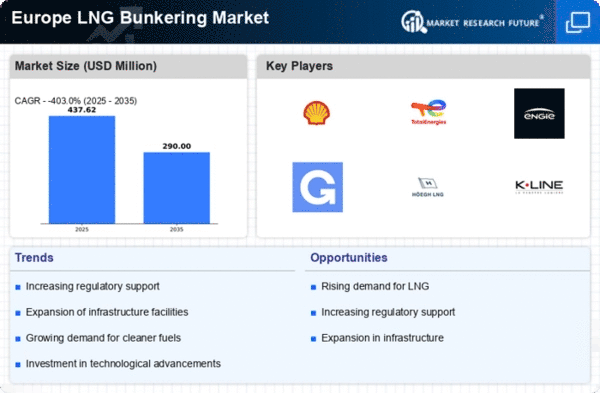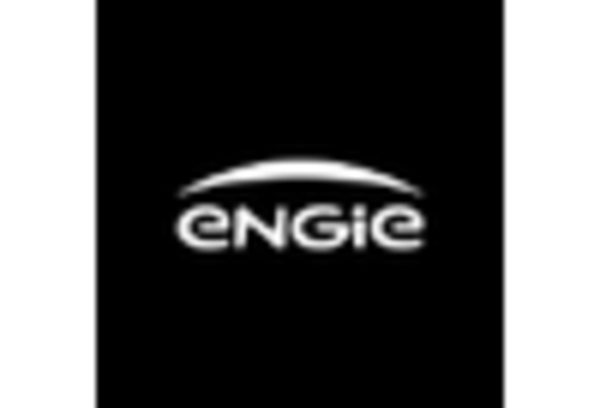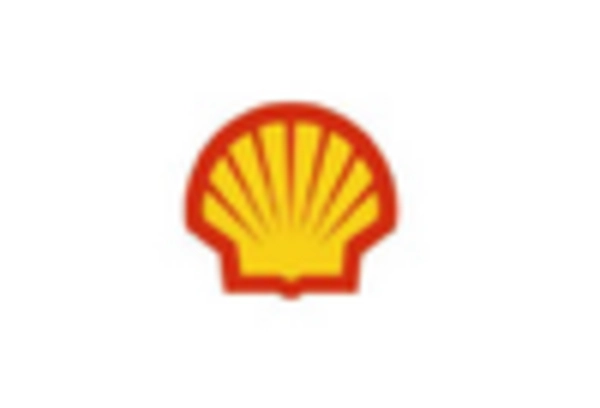Germany : Strong Infrastructure and Demand Growth
Germany holds a commanding market share of 120.0, representing a significant portion of Europe's LNG bunkering landscape. Key growth drivers include stringent environmental regulations promoting cleaner fuels, alongside government initiatives aimed at enhancing LNG infrastructure. The demand for LNG is bolstered by the shipping industry's shift towards sustainable practices, with major ports like Hamburg and Bremen investing in bunkering facilities to accommodate this transition. Furthermore, Germany's commitment to renewable energy integration supports LNG as a transitional fuel, fostering consumption patterns that favor cleaner alternatives.
UK : Strategic Ports and Regulatory Support
The UK boasts a market share of 90.0, driven by strategic port locations such as London and Southampton, which are enhancing their LNG bunkering capabilities. The UK government has implemented favorable regulatory frameworks to support LNG adoption, including incentives for cleaner shipping technologies. Demand trends indicate a rising interest in LNG among shipping companies, driven by the need to comply with the International Maritime Organization's emissions regulations. The competitive landscape features major players like Shell and TotalEnergies, who are investing in infrastructure to capture this growing market.
France : Innovative Solutions and Infrastructure Growth
France holds a market share of 70.0, with significant investments in LNG infrastructure, particularly in ports like Marseille and Dunkirk. The growth is fueled by government policies promoting LNG as a cleaner alternative to traditional marine fuels, aligning with EU emissions targets. Demand is increasing as shipping companies seek to reduce their carbon footprint, supported by initiatives from TotalEnergies and Engie, who are leading the charge in developing innovative bunkering solutions. The competitive landscape is characterized by collaboration between public and private sectors to enhance LNG availability.
Russia : Emerging Market with Unique Challenges
With a market share of 60.0, Russia is positioning itself as a key player in the LNG bunkering market, particularly in the Arctic region. The growth is driven by the country's vast natural gas reserves and government initiatives aimed at developing LNG infrastructure in ports like Murmansk and Vladivostok. However, regulatory challenges and geopolitical factors may hinder rapid expansion. The competitive landscape includes local players and international firms like Höegh LNG, who are exploring partnerships to enhance service offerings. The demand is primarily driven by shipping routes in the Northern Sea, emphasizing the need for reliable bunkering solutions.
Italy : Strategic Location and Growing Demand
Italy's market share stands at 50.0, benefiting from its strategic Mediterranean location, which is crucial for LNG bunkering. Key growth drivers include government support for cleaner fuels and investments in infrastructure at ports like Genoa and Trieste. The demand for LNG is rising as shipping companies seek to comply with EU regulations on emissions. The competitive landscape features major players like Wärtsilä and local firms, focusing on enhancing bunkering services. The business environment is favorable, with increasing collaboration between public and private sectors to promote LNG adoption in maritime transport.
Spain : Emerging Market with Strong Potential
Spain holds a market share of 40.0, with significant potential for growth in the LNG bunkering sector. The government is actively promoting LNG as a cleaner alternative, supported by initiatives in ports like Barcelona and Algeciras. Demand trends indicate a shift towards LNG among shipping companies, driven by regulatory pressures to reduce emissions. The competitive landscape includes key players like Gasum and local firms, who are investing in infrastructure to meet growing demand. The business environment is evolving, with increasing interest from international players looking to enter the Spanish market.
Rest of Europe : Varied Markets with Unique Opportunities
The Rest of Europe accounts for a market share of 26.0, showcasing a diverse LNG bunkering landscape across various countries. Growth drivers include regional regulations promoting cleaner fuels and investments in infrastructure. Demand patterns vary significantly, with some countries prioritizing LNG adoption more aggressively than others. The competitive landscape features a mix of local and international players, each adapting to unique market conditions. Key applications include shipping and industrial uses, with opportunities for growth in emerging markets as awareness of LNG benefits increases.


















Leave a Comment